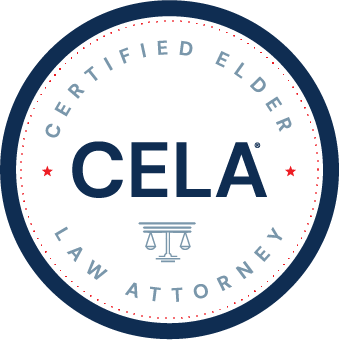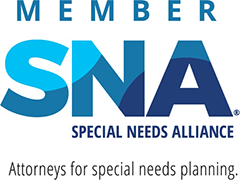Firm News
Serious Consequences for Special Needs Trusts - Social Security's Recent Policy Regarding the "Sole Benefit" Rule
Recent Social Security Administration (SSA) rules have the potential to impact the validity and administration of special needs trusts. This article addresses important implications of paying for third party travel and paying third parties for goods and services with the funds of a special needs trust.
Background
When OBRA ’93 was enacted, it created the familiar exception to Medicaid’s strict transfer without fair consideration rules, which we now commonly call the special needs trust exception. The Medicaid special needs trust exceptions are closely connected with trust rules for qualifying for SSI (Supplemental Security Income). Both have provisions establishing that an eligible trust for a disabled individual will not be considered a countable resource.
There are two options under the special needs trust exception: establishing an individual special needs trust or joining a pooled trust. OBRA ‘93 added a “special needs trust statute,” which stated that if a person with disabilities, under the age of sixty-five, has money in his or her own name (for example, because of a lawsuit settlement, direct inheritance, savings, or gift), the parent, grandparent, or guardian of the disabled person can create a special needs irrevocable trust and arrange for the transfer of the individual’s assets to the trust. If there is no one to establish the trust, the individual can petition the court to create a special needs trust. If, for some reason, creating a separate trust was not practical, the disabled person could contribute the money to a pooled trust: a trust established and managed by a non-profit association where separate accounts for each beneficiary are maintained, but the funds are pooled for investment purposes. An added benefit of the pooled trust provisions is that the disabled individual himself or herself can join the pooled trust, without relying on a parent, grandparent, guardian, or the court.”
The word “sole” only occurs once in the special needs trust statute under the pooled trust provisions: “Accounts in the trust [must be] established solely for the benefit of individuals who are disabled…by the parent, grandparent, or legal guardian of such individuals, by such individuals, or by a court….” When read in the context of the requirements for a pooled trust, the “sole benefit” rule makes sense so that the individuals pooled account is preserved that specific individual, and not used for the other pooled trust beneficiaries.
Currently, Social Security’s Program Operations Manual System (POMS) relating to eligibility for SSI addresses the sole benefit rule and states:
Under the special needs trust exception, the trust must be established for and used for the benefit of the disabled individual. SSA has interpreted this provision to require that the trust be for the sole benefit of the individual…. Any provisions that provide benefits to other individuals or entities during the disabled individual’s lifetime, or allow for termination of the trust prior to the individual’s death and payment of the corpus to another individual or entity (other than the State(s) or another creditor for payment of goods and services provided to the individual), will result in disqualification for the special needs trust exception. (Emphasis added.)
What, though, does the term “sole benefit” mean? In the past, drafters and trustees may have used a less stringent approach to this “sole benefit” requirement in the area of travel, with the philosophy being that it may be more cost effective and much less burdensome to pay for family to visit the individual than pay for travel expenses of the individual to go visit the family (and certainly, seeing family or friends could benefit the individual). Another philosophy was that paying for the individual and the family to travel together on family vacations would benefit the individual.
Recent SSA Policy Change
On May 15, 2013, after more than a year of failed attempts at narrowing the interpretation of the term “sole benefit,” and the concept of payment to third parties, SSA issued a revision to POMS addressing and limiting allowable third party expenses. Payments to third parties for travel and for goods and services are allowed only in the following situations:
• Third party travel expenses which are necessary in order for the trust beneficiary to obtain medical treatment; and
• Third party travel expenses to visit a trust beneficiary who resides in an institution, nursing home, or other long-term care facility (e.g., group homes and assisted living facilities) or other supported living arrangement in which a non-family member or entity is being paid to provide or oversee the individual’s living arrangement. The travel must be for the purpose of ensuring the safety and/or medical well-being of the individual; and
• Payments to a third party that result in the receipt of goods or services by the trust beneficiary.
Ensuring administration of a trust in compliance with the travel provisions of this new rule is not enough. The new rule regarding third party expenses has the potential to affect every special needs trust, even when the trustee has been conservative in limiting third party travel in the past. Any otherwise valid trust containing third party travel expense provisions that are broader than those found in POMS SI 01120.201F.2.b. must be amended within 90 days. The 90-day period begins on the day the recipient of SSI benefits or representative payee is informed that the trust contains a third party travel expense provision that must be amended in order to continue qualifying for treatment as an individual or pooled special needs trust under 42 U.S.C. § 1396(d)(4)(A) or (C). After the 90-day grace period, if the trust still fails to meet the new requirements, SSA will begin counting the trust as a resource under normal resource counting rules and the trust beneficiary will likely lose SSI benefits (and Medicaid benefits, if the individual’s Medicaid eligibility relies on being eligible for SSI).
While the provision of the new rule relating to goods and services above does not require reformation of an existing trust, trustees should thoroughly document the need for services (over and above expectations of parental support, if the beneficiary is a minor). This can be done though care manager or physician orders or recommendations.
Be Proactive and Review and Reform Trusts if Needed
We strongly recommend that trustees review their special needs trusts to determine whether the trust includes authority to pay for third party travel for purposes other than to secure medical treatment for the beneficiary or provide oversight of the beneficiary’s well-being. Trustees would be well advised to reform any non-complying trusts before SSI redeterminations to avoid further scrutiny of the trust and possible penalties, including the loss of SSI benefits. In addition, Trustees should begin precise documentation of the need for family caregivers, if these caregivers are paid by the trust.
At a minimum, a trustee should request a review and opinion by legal counsel to determine if the trust complies with current SSA rules.
If you need assistance in reviewing a trust or petitioning the court to reform a trust, please do not hesitate to contact our office.












